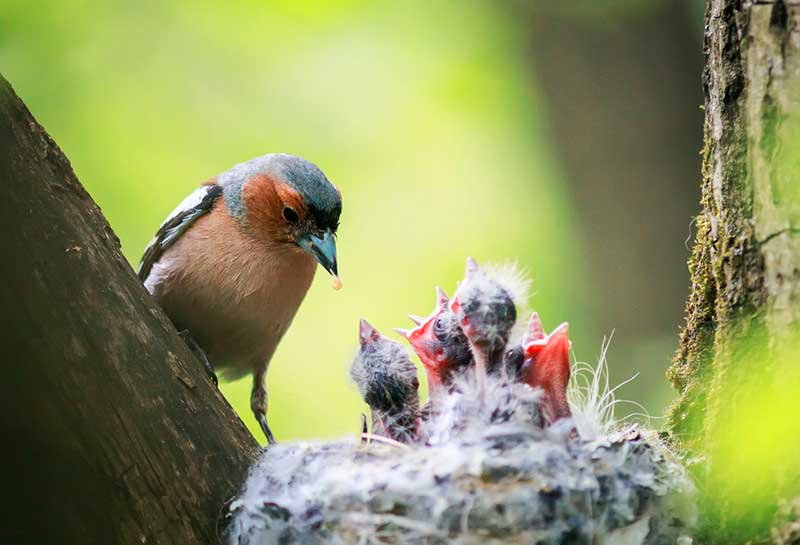Main Menu

During breeding season, we get lots of people writing to ask us what they should do if they find a baby bird on the ground. Many people remember being told as children to keep away from baby birds and are concerned that if they handle a baby bird it will be rejected by its parents.
But is it true that wild birds are so sensitive to smell that they will abandon their chicks and eggs if they catch the faintest whiff of human scent?
The truth is that birds will not leave their nests or chicks if the smell of humans is on their babies or eggs. Most garden birds have a very poor sense of smell as their olfactory bulbs are relatively small. They can’t detect the scent of a human, let alone that left behind after someone has touched an egg or picked up a bird.
Even if they could smell human scent on their eggs or chicks, birds are unlikely to abandon them for this reason alone. They invest an awful lot of time and energy in producing their offspring and the residue left behind by someone’s hands is unlikely to be enough for them to decide that the nest is no longer viable. Birds only abandon their nests if they feel that they are no longer safe and there is a real threat of danger nearby.
After egg-laying, it is quite normal for parent birds to leave their nest periodically. Most birds don’t start incubating until the final egg has been laid and during the day they’ll regularly leave the nest to find food for themselves. Therefore, if you stumble across an empty nest during breeding season there is generally no need to be alarmed and you should leave the nest well alone.
If you disturb the eggs while the parents are away, on their return they may notice that the eggs have been moved. They may think that a predator is close by and could abandon the nest if they feel sufficiently threatened. But in this situation, they are responding to visual clues rather than olfactory signals.
If you find a baby bird on the ground it will either be a nestling or a fledgling. It’s important to understand the difference between the two so you know what you should do and whether you need to help it or not.
Most of the baby birds found on the ground are fledglings. Fledgling birds typically have their first coat of feathers and can move about by themselves. They may be able to hop along the ground, flap their wings, and even feed themselves. If you do pick one up, you’ll find that it will grip onto your fingers with its toes.
It is perfectly normal for fledglings to spend a few days on the ground while they learn to fly. During this time, they will also be learning other behaviours such as vocalizations and survival skills and their parents are probably nearby but allowing them some independence to grow and develop. Unless a fledgling is in immediate danger you should leave well alone. If you don’t think it’s safe, then move it a short distance away so its parents can still find it and return to care for and protect it.
Nestlings are baby birds that are just a few days old. They won’t have feathers and may only be able to move by dragging themselves along the ground. Nestlings are too young to be able to survive outside the nest so if you find one on the ground you can gently pick it up and pop it back in its nest. The parents will not be able to smell you and will continue to care for it until it’s ready to leave the nest.
Do not take away a fledgling or a nestling to look after yourself unless you’re sure the parents are dead or have gone for good. Get in touch with a local wildlife rehabilitation centre for help and advice.
Remember it is an offence under Section 1 of the Wildlife and Countryside Act (1981) to intentionally take, damage or destroy the nest of any wild bird while it is in use or being built, or to intentionally kill, injure or take chicks or adults, or intentionally take or destroy any eggs.
So where did this myth originate from? We going to take a wild guess and suggest that it was a way for (human) parents to try and stop their children picking up baby birds and bringing them home as pets. It may have been more effective to issue the dire warning that a tiny bird would be abandoned by its parents and starve to death than tell them the truth.
3 Responses
I hit a fledgling magpie with my car and, finding it alive but struggling to get around, I took it home, thinking that one or both of its wings were broken, and it would be prey for a predator. (Friday late, so vet closed for the weekend). After it had got over the shock, it began to improve and feed, and I realised its wings were fine, legs felt okay, but probably its foot was injured, as it has a limp.
So now the question is, now that it’s improved, if I took it back to where it was, would its parents accept it back, after a couple of days away? Is that too long? Would they still be around looking for it?
My mum got baby birds falling from guttering think nest up there can’t touch it my mum 87 years old don’t like this sort thing my brother in law had put couple dead ones in bin one still alive anyone in didcot area know s what to do I don’t live here my mum does alone
Interesting Information